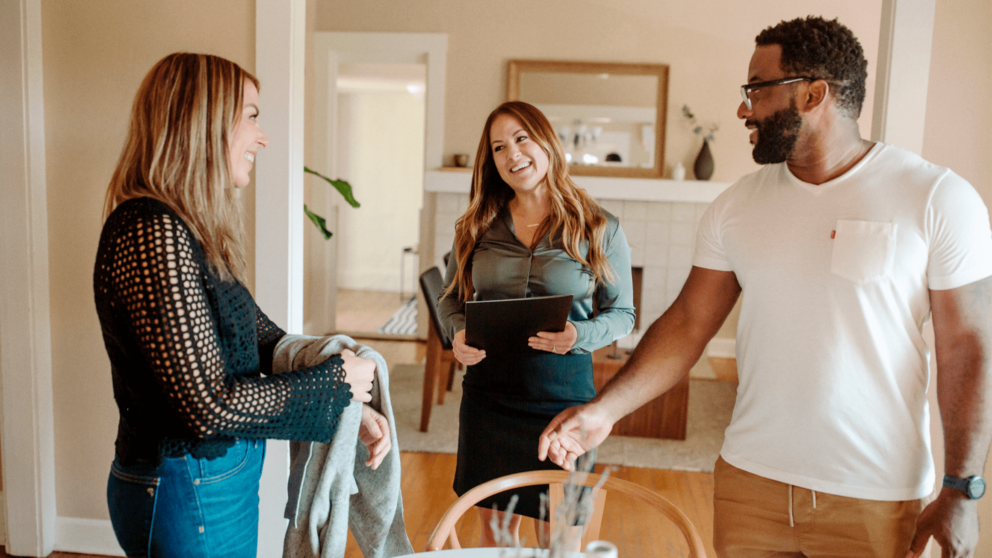Guide to buying your first home
Taking that first step onto the property ladder is an exciting but also daunting time. We’re here to iron out some of the creases and make what seems like a complicated process easy.
Firstly, it’s important to manage your expectations good things take time so it won’t be an instant process, but it can be a smooth one providing you’ve made the right provisions. Before you start looking at the type of property you liked or areas, you’d like to live in asses your budget.
Speak to a mortgage broker, financial advisor, bank, or building society
If you’re able to buy in cash, that’s great but you still may want to speak to someone in the financial sector such as an independent financial advisor so you can run through your finances, which includes everything from bills to basic living costs.
If you are planning on purchasing with a mortgage, speak to a mortgage broker, bank, or building society and asses how much you can borrow. You’ll also need to run through your finances to ensure you’ll be able to keep up with monthly repayments alongside paying bills and living costs.
Shared ownership is another great way to buy a share of a home if you can’t quite afford the entire property. You can own between 10% to 75% of the home’s value (depending on local conditions) and pay rent on the remaining share. Later on, you can buy a bigger share when you can afford to. To qualify for the scheme, you must have a household income of less than £80,000 a year or less than £90,000 in London. It’s worth noting that shared ownership properties are always leaseholds. If this is a route you’re interested in going down it’s worthwhile getting some advice from a financial advisor. The shared ownership scheme is only available in England.
Before purchasing a property, you will also need to consider additional costs, you’ll need to pay your solicitor and a sum towards the seller’s solicitors for their time too. There may be a requirement for additional surveys to be undertaken on the property. Some properties require maintenance fees so it’s worth keeping this in mind too. Often mortgage lenders require payment for a mortgage valuation and charge a mortgage product fee. If you use a mortgage broker, they will also require payment. Depending on the price of the property you purchase you may be eligible to pay Stamp Duty.
Start your research
Once you’re clear on how much you can afford, it’s time to start thinking about where you would like to purchase.
Being a first-time buyer if you have a Help to Buy ISA or Lifetime ISA (LISA) you may be entitled to use the Help to Buy Scheme and place a 5% deposit on the property and receive an equity loan of 20% of the property (40% in London). This will very much depend on the type of property you’re buying, the cost of the property, and your own personal circumstance so it is worthwhile seeking some advice on this to see if you are eligible to use the scheme.
You’ll want to consider looking at the following:
- Transportation links
- Crime levels
- Flood zones
- School catchment areas
- Local infrastructure plans
- Local development plans
Apply for a mortgage agreement in principal
It’s time to go back to the mortgage broker or bank that you initially spoke to and get them to source an agreement in principle (AIP). An AIP is confirmation from a mortgage lender that in principle based on the information you have provided that they are willing to lend you a certain amount of money. This agreement typically lasts between 60 and 90 days depending on the lender and the circumstance you may be able to extend it.
Start house hunting
Property portals and property websites are a great place to start having a look for your first home.
You may also want to register with a few local estate agents and tell them what it is you’re looking for so if your ideal property does come on the market they have you in mind.
With online viewings becoming increasingly popular you may be able to view some of the properties you’re interested in online before going to see them in person which will save time and effort narrowing down suitable properties.
Make an offer
So, you’ve found your dream home it’s time to make an offer on the property. It’s very common for people to offer less than asking price however if you have your heart set on the property you may need to offer asking price or more depending on if other people are also interested in the property.
Take a look at properties in the area that have sold recently and see how much they’ve sold for to get a gauge on how much the property is worth.
Put the offer in an email to the estate agent so there aren’t any misunderstandings around when you offered and how much. Along with mentioning anything that makes you more favourable such as being a first-time buyer and essentially chain free and that you’ve got your AIP.
Apply for a mortgage
As soon as your offer is accepted on the property, it’s time to apply for your mortgage. At this stage you should already have an idea of how much you can afford to pay towards your mortgage per month. You may want to think about how long you would like the mortgage to be and if a fixed-rate mortgage or tracker suits you better.
Instruct a solicitor
Great your offer has been accepted! It’s time to instruct a solicitor. A solicitor or sometimes referred to as conveyancer, deals with the legal side of transferring a property from buyer to seller.
A conveyancing solicitor is responsible for:
Conducting legal searches to ensure the property is safe for use and in a liveable condition
- Giving legal advice
- Dealing with the Land Registry
- Transferring the funds to pay for your property
- Stamp Duty Land Tax, Buildings and Land Transaction Tax
- Liaising with third parties
You may want to ask your mortgage lender, mortgage broker, or financial advisor if they have a recommended a solicitor. If the property you’re purchasing is being sold by an estate agent, they may recommend a solicitor for you to use. However, you are not bound to using their solicitor and can choose your own if you wish to do so.
The legal side of purchasing a property can take a considerable amount of time and usually requires a lot of paperwork, so be ready for lots of signing of documents.
It’s also important to keep in mind that there may be setbacks such as sellers dropping out, which is just plain bad luck and can be very frustrating and upsetting.
An uncommunicative solicitor can also be very stressful. Before you instruct a solicitor, enquire about what the process is regarding receiving updates. Find out if they use an online portal or if you’ll be speaking directly to your solicitor or if there’s an admin team you should be communicating with.
Getting additional surveys
Getting additional surveys are optional, but they are usually a worthwhile investment they highlight the condition of the building and its structure and will present any structural issues.
A survey can help you negotiate the purchase price, or you can ask the seller to fix any issues. There are different levels of surveys that can be performed, and it is worth discussing with your solicitor, which they feel may be best.
Pick a removal company
If you’ve got lots to move, you might want to consider hiring a removals company to make life easier. When it comes to removals, do your research. Removal companies’ costs depend on the amount that you’re moving and the distance in which you’re moving to amongst other factors. Before you agree to go with a specific company, ensure that they can accommodate your completion date.
Arranging insurance
Buildings and contents insurance is a must have and most mortgage lenders require that you have it. It needs to start from the day that you exchange contracts. This is because as soon as you exchange you are legally bound to buy the property, so if something was to happen such as the house caught fire or flooded and you weren’t insured you wouldn’t be covered.
If you are buying a new build property, the insurance doesn’t come into effect until the day that you complete on the property. Alongside home insurance you may want to think about getting life insurance, critical illness cover, and income protection. You don’t have to legally have any of these but its always worthwhile covering all bases.
Preparing to move
Moving day, is pretty much a roller coaster of emotions. In the lead up to the big day ensure you’ve got things boxed, bagged, and ready to go. Don’t forget to keep an ‘essentials’ box easily accessible consisting of tea and coffee, a kettle, toilet rolls, antibacterial wipes, bin liners, phone chargers and first aid, including any medications you normally take. You may also want to think about you’re going to eat on the first night of being in your new home and be prepared with plenty of snacks. It’s more than likely you’ll receive the keys anytime between mid-morning, to late afternoon depending on the property and if you’re in a chain. Moving things is tiresome and time-consuming and you’ll probably want to eat something quickly on the go.
Moving day – Completion
And it’s finally here… Moving day! (Otherwise known as completion). Typically, you complete around 2 weeks after exchange, but this is flexible and will depend on circumstance.
On the day of your move it will probably more than likely comprise patiently waiting for funds to be transferred by the solicitors and as soon as this is all done you should be good to go and collect the keys, your solicitor should make you aware of where you need to collect the keys from. Then you can start moving your stuff in and enjoying your new home. Its then start thinking about decorating and maybe even taking some time to relax!
We hope this helps makes things easy! If you’re looking for anything else or would like additional help and advice get in touch at customerservice@easyproperty.com





